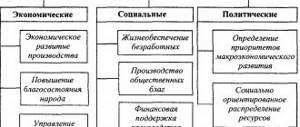Hello, dear colleague! Today's article will focus on socially oriented non-profit organizations. We will talk in detail about which organizations belong to SONPOs, how they are supported by the state, and also consider the features of the participation of such organizations in procurement within the framework of 44-FZ. The article will be useful primarily to procurement participants who belong to these organizations.
SONKO transcript
SONKO stands for socially oriented non-profit organization.
According to Part. 2.1-3 Article 2 of the Federal Law of January 12, 1996 No. 7-FZ “On Non-Profit Organizations”, socially oriented non-profit organizations are non-profit organizations created in the forms provided for by the law “On Non-Profit Organizations”, namely: public or religious organizations (associations), communities of indigenous peoples of the Russian Federation, Cossack societies, foundations, non-profit partnerships, institutions, autonomous non-profit organizations, associations of legal entities (associations and unions), with the exception of state corporations, state companies, public associations that are political parties.
Socially oriented non-profit organizations carry out activities aimed at solving social problems, developing civil society in the Russian Federation, as well as the types of activities provided for in Art. 31.1. Law “On Non-Profit Organizations”:
1) social services, social support and protection of citizens;
2) preparing the population to overcome the consequences of natural disasters, environmental, man-made or other disasters, to prevent accidents;
3) providing assistance to victims of natural disasters, environmental, man-made or other disasters, social, national, religious conflicts, refugees and internally displaced persons;
4) environmental protection and animal protection;
5) protection and, in accordance with established requirements, maintenance of objects (including buildings, structures) and territories of historical, religious, cultural or environmental significance, and burial sites;
6) provision of legal assistance on a free or preferential basis to citizens and non-profit organizations and legal education of the population, activities to protect human and civil rights and freedoms;
7) prevention of socially dangerous forms of behavior of citizens;
 charitable activities, as well as activities in the field of promoting charity and volunteering;
charitable activities, as well as activities in the field of promoting charity and volunteering;
9) activities in the field of education, enlightenment, science, culture, art, healthcare, prevention and protection of the health of citizens, promotion of a healthy lifestyle, improvement of the moral and psychological state of citizens, physical culture and sports and promotion of these activities, as well as promotion of the spiritual development of the individual ;
10) formation in society of intolerance towards corrupt behavior;
11) development of interethnic cooperation, preservation and protection of the identity, culture, languages and traditions of the peoples of the Russian Federation;
12) activities in the field of patriotic, including military-patriotic, education of citizens of the Russian Federation;
13) carrying out search work aimed at identifying unknown military graves and unburied remains of defenders of the Fatherland, establishing the names of those killed and missing in action while defending the Fatherland;
14) participation in the prevention and (or) extinguishing of fires and carrying out emergency rescue operations;
15) social and cultural adaptation and integration of migrants;
16) measures for medical rehabilitation and social rehabilitation, social and labor reintegration of persons engaged in illegal consumption of narcotic drugs or psychotropic substances;
17) promoting increased mobility of labor resources;
18) perpetuating the memory of victims of political repression.
The concept of “socially oriented non-profit organization”
The concept of NPO (socially oriented non-profit organization) was introduced in 2010 by Federal Law No. 40-FZ dated 04/05/2010 “On amendments to certain legislative acts of the Russian Federation on the issue of supporting socially oriented non-profit organizations.” the changes that occurred affected several federal laws, which largely relate to the work of organizations, their structure and specifics. These laws include the following:
- “On non-profit organizations”;
- “On the general principles of organizing legislative (representative) and executive bodies of state power of the constituent entities of the Russian Federation”;
- “On the general principles of organizing local self-government in the Russian Federation”;
- "On the protection of competition."
Finished works on a similar topic
- Course work Socially oriented non-profit organizations 400 rub.
- Abstract Socially oriented non-profit organizations 260 rub.
- Test work Socially oriented non-profit organizations 200 rub.
Get completed work or advice from a specialist on your educational project Find out the cost
One of the main tasks that the Ministry of Justice of the Russian Federation sets for itself is to carry out activities in the field of state registration of non-profit organizations. This also includes public associations, political parties, and religious organizations. It is very important that the activities of non-profit organizations be controlled by government agencies, since if this control is not exercised, there is a possibility of an adverse impact from non-profit organizations on society and people’s livelihoods.
Note 1
It should also be noted what a non-profit organization is. The authors emphasize that this is an organization that does not have the goal of making a profit as one of the main objectives of its work. This means that such organizations do not work to make a profit and its further distribution, but to carry out such socially significant activities (in the form of goods and services), which in the future will benefit people free of charge.
Are you a student at any Russian university? We invite you to a paid interview! The topic of the interview is preparation for the session and problems that arise during this Find out more
Non-profit organizations are created for various purposes: to achieve social, charitable, cultural, educational, scientific and managerial success, to protect public health, to develop physical culture and sports in various categories of the population. It is also very important to satisfy predominantly spiritual and other non-material needs, to protect their rights and freedoms, and the legitimate interests of both an individual citizen and an entire social group (organization). Non-profit organizations and their members are able to resolve the most pressing disputes and conflicts and provide legal assistance. They also pursue other goals, but their main task is to achieve the public good and create conditions that will, to one degree or another, have a positive impact on human life.
Support for socially oriented non-profit organizations
According to Part 3 of Art. 31.1 7-FZ, support for socially oriented non-profit organizations is provided in the following forms:
1) financial, property, information, consulting support, as well as support in the field of training, additional professional education of employees and volunteers of socially oriented non-profit organizations;
2) providing socially oriented non-profit organizations with benefits for paying taxes and fees in accordance with the legislation on taxes and fees;
3) procurement of goods, works, services to meet state and municipal needs from socially oriented non-profit organizations in the manner established by the legislation of the Russian Federation on the contract system in the field of procurement of goods, works, services to meet state and municipal needs;
4) providing legal entities that provide material support to socially oriented non-profit organizations with benefits for paying taxes and fees in accordance with the legislation on taxes and fees.
Subjects of the Russian Federation and municipalities, along with the forms of support established above, have the right to provide support to SONPOs in other forms through budgetary allocations from the budgets of constituent entities of the Russian Federation and local budgets, respectively.
Providing financial support to SONPOs can be carried out in accordance with the legislation of the Russian Federation through budgetary allocations from the federal budget, budgets of constituent entities of the Russian Federation, local budgets through the provision of subsidies. Federal budget allocations for financial support of SONCOs (including for maintaining a register of socially oriented organizations receiving support), including subsidies to the budgets of constituent entities of the Russian Federation, are provided in the manner established by the Government of the Russian Federation.
Also, the provision of property support to SONPOs is carried out by state authorities and local governments by transferring state or municipal property into the possession and (or) use of such non-profit organizations. The specified property must be used only for its intended purpose.
General information about socially oriented non-profit organizations
The legislation of the Russian Federation includes a standard that provides socially oriented non-profit organizations (NPOs) with the right to state support. We are talking about Federal Law No. 7 of January 12, 1996. The document reflects the requirements, following which, the company can be recognized as an NPO, as well as all the nuances regarding the formation of such an organization, the conduct of its activities, liquidation, basic areas of work, etc. Moreover, the standard provides information regarding the procedure for maintaining a register of socially oriented NPOs, and also establishes the powers of regulatory authorities in relation to supporting such organizations.
To clearly understand what is meant by the term “socially oriented NPOs,” we first need to consider what non-profit organizations are. Thus, NPOs are firms that have the following characteristics :
- the organization was created as a legal entity and registered in accordance with the procedure established by law. In this case, the designated organization may own property, but at the same time it must fulfill its obligations regarding the specified fact of ownership. Also, NPOs have the right to acquire and exercise property and non-property rights;
- the company has its own unique name, containing a note about its organizational and legal form;
- the organization has a balance sheet and/or budget;
- the company has a current account in any bank in the Russian Federation;
- if there is a corresponding expression of will of the founder of the organization, it is appropriate to create a seal containing general information about the company in Russian.
Such organizations do not pursue the goal of making a profit; on the contrary, the main task is to help people in need of various kinds. In most situations, the marked formations are formed for an unlimited period. However, the opposite is also possible if the formation charter specifies the deadline for carrying out activities.
There are many companies in the Russian Federation for which making a profit is not their main goal. However, it is appropriate to attribute the status of socially oriented not to all organizations.
Register of socially oriented non-profit organizations
According to Art. 31.2 7-FZ “On Non-Profit Organizations” federal executive authorities, executive authorities of constituent entities of the Russian Federation and local administrations providing support to SONPOs form and maintain federal , state and municipal registers of socially oriented non-profit organizations - recipients of such support.
The register of SONCO recipients of support includes the following information about the non-profit organization:
1) full and (if available) abbreviated name, address (location) of the permanent body of the non-profit organization, state registration number of the record of state registration of the non-profit organization (main state registration number);
2) taxpayer identification number;
3) the form and amount of support provided;
4) duration of support;
5) name of the state authority or local government body that provided support;
6) the date of the decision to provide support or the decision to terminate the provision of support;
7) information about the types of activities carried out by the SONCO that received support;
 information (if available) about violations committed by the SONCO that received support, including misuse of provided funds and property.
information (if available) about violations committed by the SONCO that received support, including misuse of provided funds and property.
The procedure for maintaining registers and storing documents submitted by SONCO, requirements for technological, software, linguistic, legal and organizational means of ensuring the use of these registers are established by the authorized federal executive body.
The information contained in the SONPO registers is open to the public.
So, for example, you can find the register of SONCOs in Moscow here, and the register of St. Petersburg here.
Forms of socially oriented non-profit organizations
So, there are the following types of non-profit organizations focused on solving public problems.
- Associations of the following nature:
- public;
- religious.
- Communities represented by nationalities living on the territory of Russia, united according to the following characteristics:
- small numbers;
- indigenous people living in certain territories.
- Societies organized by representatives of the Russian Cossacks.
- Social funds.
- Partnerships created on a non-profit basis.
- Private institutions.
- Organizations representing the state and municipality.
- Institutions maintained at the expense of the country's budget.
- Autonomous non-profit organizations.
- Various unions and associations.
All issues regarding the activities of these institutions are regulated by the Federal Legislative Act
Regulation of the activities of all the above-described authorities is assigned to Federal Law No. 7-FZ “On Non-Profit Organizations”.
What is a socially oriented NPO?
Socially oriented non-profit organizations are non-profit organizations created in the forms provided for by Federal Law No. 7 “On Non-Profit Organizations” (with the exception of state corporations, state companies, public associations that are political parties) and carrying out activities aimed at solving social problems in accordance with the constituent documents. problems, the development of civil society in the Russian Federation, as well as the types of activities listed in clause 31.1 of Federal Law No. 7.
Let's check if your organization is socially oriented. To do this you need to answer 3 questions
1. Does its organizational and legal form correspond to one of the following?
- religious organization (association),
- community of indigenous peoples of Russia,
- Cossack society,
- non-commercial partnership,
- institution,
- autonomous non-profit organization,
- social, charitable and other foundation,
- association, union
- public organizations (associations): public organization; social movement; public fund; public institution; public body
- another form of NPO provided for by federal laws (with the exception of state corporations, state companies, political parties).
2. Is at least one type of activity listed below indicated in the organization’s Charter:
- Social support and protection of citizens;
- Preparing the population to overcome the consequences of natural disasters, environmental, man-made or other disasters, to prevent accidents;
- Providing assistance to victims of natural disasters, environmental, man-made or other disasters, social, national, religious conflicts, refugees and internally displaced persons;
- Environmental protection and animal welfare;
- Protection and, in accordance with established requirements, maintenance of objects (including buildings, structures) and territories of historical, religious, cultural or environmental significance, and burial sites;
- Providing legal assistance free of charge or on a preferential basis to citizens and non-profit organizations and legal education of the population, activities to protect human and civil rights and freedoms;
- Prevention of socially dangerous forms of behavior of citizens;
- Charitable activities, as well as activities in the field of promoting charity and volunteering;
- Activities in the field of education, enlightenment, science, culture, art, healthcare, prevention and protection of the health of citizens, promotion of a healthy lifestyle, improvement of the moral and psychological state of citizens, physical culture and sports and promotion of these activities, as well as promotion of the spiritual development of the individual;
- Formation of intolerance towards corrupt behavior in society;
- Development of interethnic cooperation, preservation and protection of the identity, culture, languages and traditions of the peoples of the Russian Federation.
3. Does your organization actually carry out activities today that are socially oriented?
If you answered yes to all three questions, your organization is, in fact, and in accordance with the legislation of the Russian Federation, a socially oriented non-profit organization (SO NPO) and can apply for support from state authorities and local governments on a priority basis.
In the Samara region, in accordance with regional law No. 127-GD “On state support for socially oriented non-profit organizations in the Samara region”, adopted in December 2012, any such organization, regardless of the duration of activity from the moment of state registration as a legal entity, can count on information and consulting support. But financial, property support, in the form of training, retraining and advanced training of workers and volunteers is provided only to those organizations that have been carrying out socially oriented activities in the region for at least 3 years from the date of state registration.
The same law establishes additional types of activities that are recognized as socially oriented on the territory of the Samara region in addition to those listed in the federal law:
- Protection of family, motherhood, childhood and paternity (in the Samara region)
- Development of children's and youth social movements, support of children's, youth public associations and public associations working with children;
- Development of civil society institutions (in the Samara region)
- Strengthening interethnic, interethnic and interfaith relations, preventing extremism and xenophobia (in the Samara region)
- Assistance to law enforcement (in the Samara region)
- Activities in the field of patriotic education (in the Samara region)
- Ensuring the safety of citizens' recreation on water bodies (in the Samara region)
- Promoting the social rehabilitation of orphans, children without parental care, children in difficult life situations (in the Samara region).
REGISTER OF SOCIALLY ORIENTED ORGANIZATIONS
The current legislation of the Russian Federation and the Samara region does not contain a definition of “socially significant NPOs” and does not provide for maintaining lists of such organizations.
The register of socially oriented NPOs is maintained by federal executive authorities, executive authorities of constituent entities of the Russian Federation and local administrations that provide them with support.
. Only after your organization has received any support at one of these levels is the following information included in the Register:
- Full and (if available) abbreviated name, address (location) of the permanent body of the non-profit organization, state registration number of the record of state registration of the non-profit organization (main state registration number);
- Taxpayer identification number;
- Form and extent of support provided;
- Duration of support;
- Name of the state authority or local government that provided support;
- Date of decision to provide support or decision to terminate support;
- Information about the types of activities carried out by the socially oriented non-profit organization that received support;
- Information (if available) about violations committed by the socially oriented non-profit organization that received support, including misuse of provided funds and property.
More details about the types of state support for SO NPOs in the Samara region can be found in the regional law:
Law of the Samara Region on state support for socially oriented non-profit organizations in the Samara Region
Source: https://songo63.ru/2016/07/15/so-nko/
Who belongs to socially oriented non-profit organizations
Socially oriented non-profit organizations (SONO) are non-profit organizations carrying out activities aimed at solving social problems and developing civil society in the Russian Federation[5]:
|
| At least one of these types of activities must be in the charter |
| Preferences under Law 44-FZ do not apply to SONOs whose founders are the Russian Federation, constituent entities of the Russian Federation or municipalities[6] |







